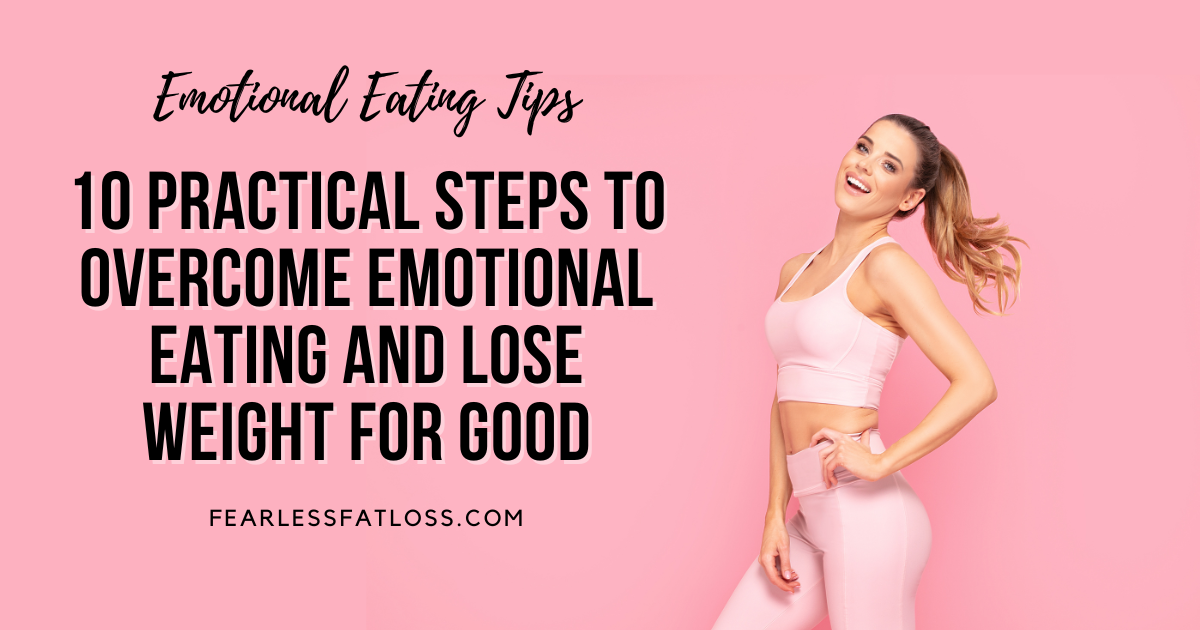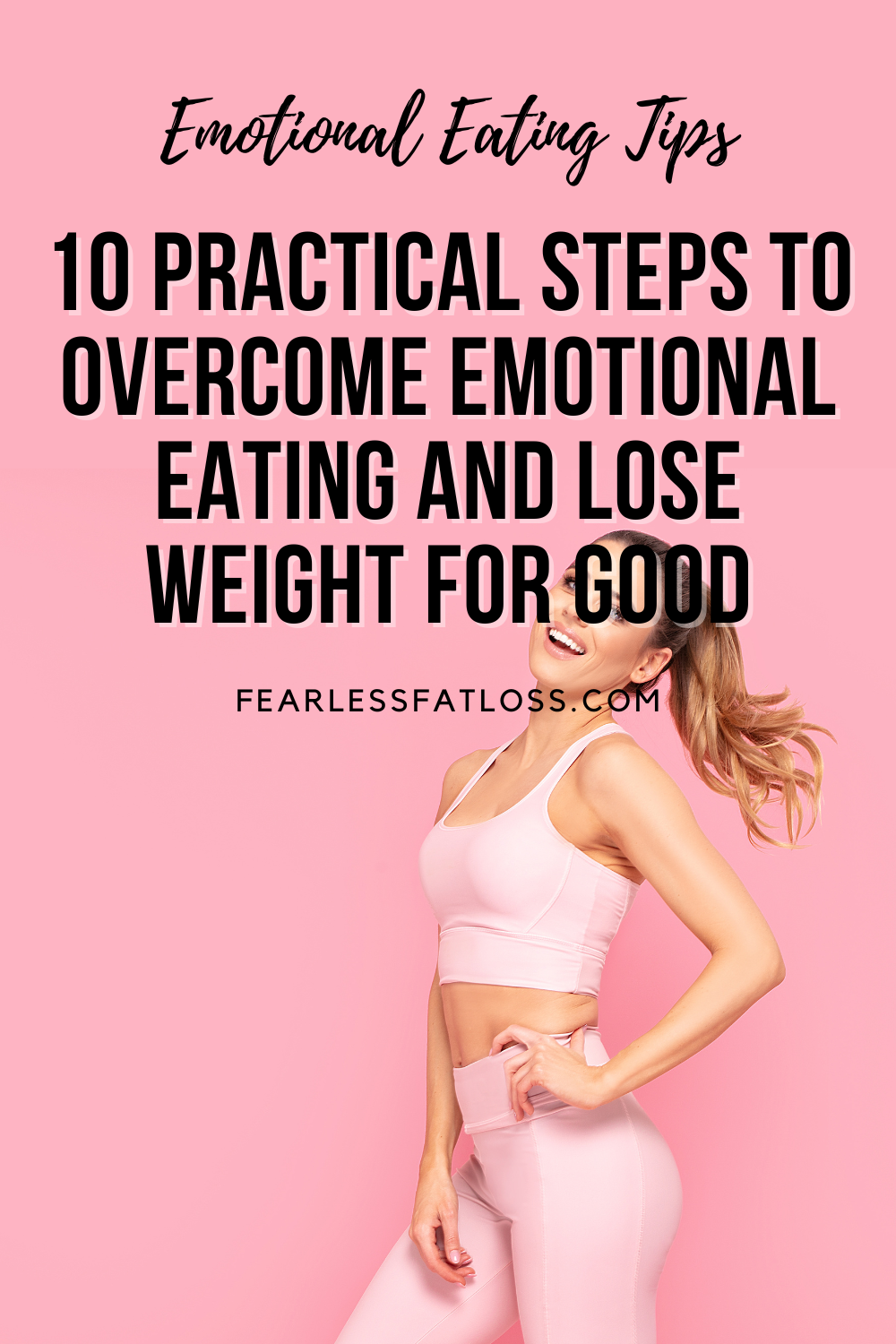10 Practical Steps to Overcome Emotional Eating and Lose Weight for Good
Emotional eating can often feel like an uphill battle. Many smart, successful women struggle with it, reaching for comfort food not out of hunger but due to stress, sadness, boredom, or other emotions.
As a mind-body weight loss coach, I’ve seen countless women since 2009 overcome emotional eating, achieve healthier habits, and transform their lives. Today, I’m here to share a comprehensive guide with you, a list of ten practical steps to help you conquer emotional eating.
Follow these 10 steps to reclaim control over your eating habits and set yourself on a path to lasting weight loss!
10 Practical Steps to Overcome Emotional Eating and Lose Weight for Good
1. Identify Your Triggers to Overcome Emotional Eating
The first step in overcoming emotional eating is understanding what prompts you to eat when you’re not physically hungry. Common triggers include stress, loneliness, fatigue, or boredom. Start by keeping a food and mood journal, noting when and why you eat, especially if it’s outside of mealtimes. Recognizing your triggers is crucial, as awareness is the foundation for change.
2. Develop Healthy Coping Mechanisms to Overcome Emotional Eating
Once you’re aware of your triggers, it’s essential to replace eating with healthier ways of dealing with your emotions. For example, if you eat when stressed, consider incorporating stress-relieving activities like deep breathing exercises, going for a walk, or talking to a friend. Developing these alternative coping mechanisms gives you options other than food to manage your emotions.
3. Practice Mindful Eating to Overcome Emotional Eating Now
Mindful eating means being fully present with your food, savoring each bite, and eating slowly. By paying attention to the flavors, textures, and experience of eating, you’ll naturally eat less and feel more satisfied. Mindful eating also helps you distinguish between emotional and physical hunger. Ask yourself, “Am I truly hungry, or am I eating out of habit?”
4. Keep a Consistent Eating Schedule to Overcome Emotional Eating
One of the main reasons people turn to emotional eating is because they skip meals or let themselves get overly hungry. When you’re hungry, it’s harder to control cravings, leading to poor food choices. Aim to eat balanced meals every three to four hours to keep your blood sugar stable and prevent intense hunger, which can often trigger emotional eating.
5. Stock Up on Healthy Snacks to Overcome Emotional Eating
It’s much easier to make a healthy choice if you have nutritious options available. Stock up on healthy snacks like fresh fruits, vegetables, nuts, and yogurt. When you feel an urge to snack between meals, these options provide nutrients without the guilt. Over time, you’ll train your brain to associate snacks with nourishing foods rather than comfort food.
6. Get Moving to Overcome Emotional Eating
Physical activity can be a powerful tool in overcoming emotional eating. Exercise releases endorphins, which can improve your mood and reduce stress, one of the most common triggers for emotional eating. Regular exercise can also help you feel more in tune with your body, making you more mindful of what you eat. Choose activities you enjoy, like walking, dancing, or cycling, to make it sustainable.
7. Set Realistic Goals
Sometimes emotional eating is fueled by frustration with weight loss or body image. Setting realistic, achievable goals can help you focus on progress rather than perfection. Start with small goals, like walking 10,000 steps a day or drinking more water, and gradually build from there. Celebrate each milestone to boost your confidence and keep you motivated.
8. Create a Support System to help Overcome Emotional Eating
Having a support system can be incredibly helpful when working to overcome emotional eating. Friends, family, or a support group can provide encouragement, accountability, and empathy. Consider joining a community that focuses on healthy habits, weight loss, or emotional well-being. Sharing your journey and hearing others’ experiences can remind you that you’re not alone in your struggles.
9. Challenge Negative Self-Talk to Overcome Emotional Eating Now
Negative self-talk often drives emotional eating. If you find yourself thinking, “I’ve already messed up today, so I may as well eat more,” challenge that thought. Replace it with a positive, forgiving statement like, “One slip-up doesn’t ruin my progress.” Shifting your mindset from all-or-nothing to a balanced approach will help you feel more empowered to make healthy choices, even after setbacks.
10. Focus on Non-Food Rewards to Overcome Emotional Eating
Rewarding yourself doesn’t have to involve food. Start identifying ways to treat yourself that align with your health goals. Non-food rewards could be buying a new book, taking a relaxing bath, or spending time on a hobby you love. When you associate reward with something other than food, you’ll be less likely to rely on eating as your go-to form of comfort.
Practical Tips for Long-Term Success
Overcoming emotional eating isn’t about overnight changes; it’s about gradually shifting your habits and mindset. Embrace progress rather than perfection and remember that setbacks are part of the journey. If you find that emotional eating continues to be a challenge, consider speaking with a therapist or coach specializing in emotional eating. They can help you dig deeper into the emotional roots of your eating patterns and give you additional tools for success.
Final Thoughts
Emotional eating is complex, but with these ten practical steps, you can start building healthier habits and move closer to your weight loss goals. Remember, the goal is not to overcome emotional eating instantly with these tips but to gain control over your eating over time. By staying aware, practicing self-compassion, and being patient with yourself, you’ll find that it’s possible to overcome emotional eating and achieve lasting change.
Ready to get started? Try implementing just one or two of these steps today and notice the positive impact on your relationship with food and your overall well-being.
Want the Fast Track to Overcome Emotional Eating?
I understand how challenging it can be to get motivated, get committed, and take consistent action over time until you start to see some changes. There is a faster way to overcome emotional eating, if you want it.
Since 2009 I’ve been professionally coaching smart, successful women (and a few cool men!) out of the struggle with emotional eating along with other unhealthy eating habits. We do this in eight weeks or less with my proven step-by-step system. It’s critical to go within to heal the root of your unhealthy eating and once you do this, you really can set yourself free.
If you’re feeling beyond frustrated with the struggle and you’re ready to break free then apply now for a complimentary weight loss discovery session with me. It’s your first step towards freedom from the struggle!





